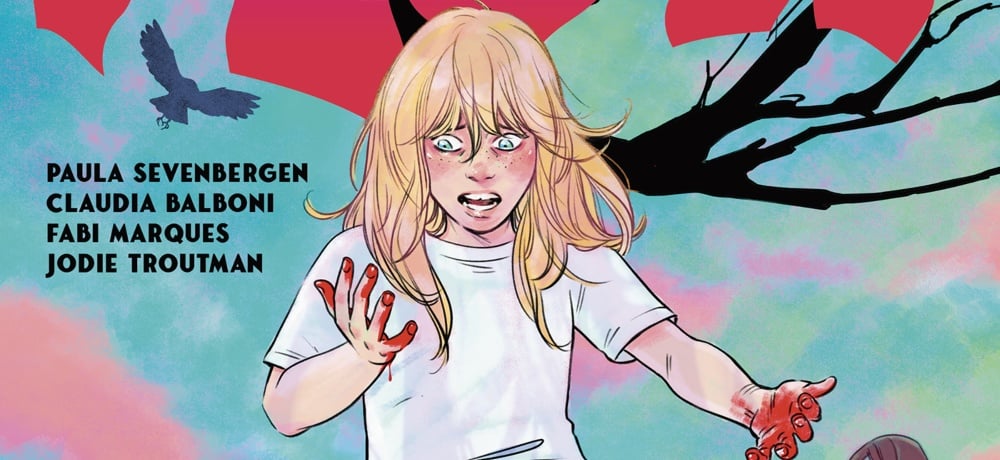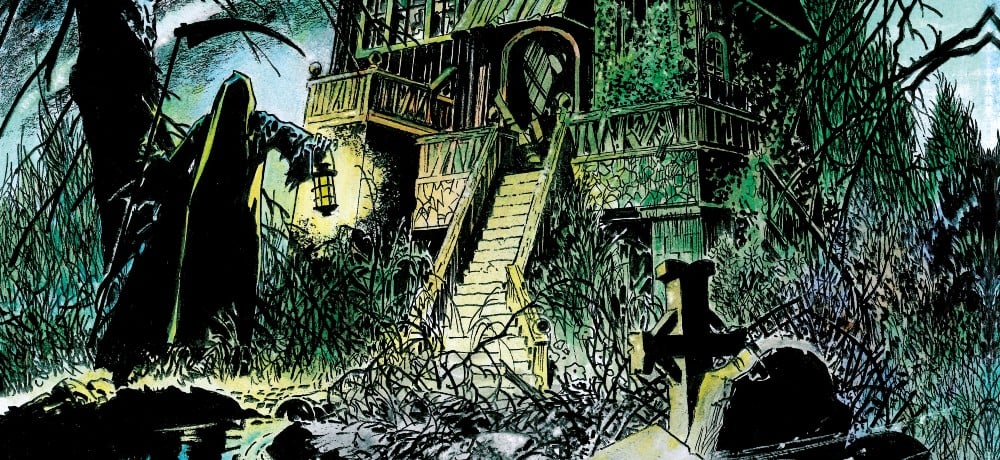





Syfy's new series Channel Zero: Candle Cove premieres tonight at 9:00pm ET, but its story may already haunt you. Channel Zero's first season is based on one of the most haunting "Creepypastas," stories published online that use a wide range of narrative styles and multi-media presentations to blur the lines between fiction and reality. Before viewers tune into Candle Cove tonight, we caught up with Channel Zero showrunner Nick Antosca (Hannibal TV series, The Forest) to discuss the six-episode adaptation of Kris Straub's chilling Creepypasta, as well as what viewers can expect from Channel Zero's second season.
Candle Cove is one of the creepiest Creepypasta stories out there. When did you first become aware of the Candle Cove story? Were you a fan of it before coming onto this project?
Nick Antosca: I was, yeah, I read it a couple years ago. I have insomnia and will often stay up at night going down internet wormholes, and a lot of those end up with scary stories and paranormal stuff and weird Wikipedia links. So Candle Cove and the NoEnd House and a couple of other Creepypasta stories were in my consciousness for a long time, and when I heard that Max Landis has the rights to it and was doing something with it, I got involved as soon as I could.
Kris' story is such a perfect display of what Creepypasta is. It taps into something that's so familiar, it's just strange. This idea of something you half-remember from your childhood that nobody really knows where it came from or what it is, and there's a sinister undercurrent to it, even though it seems friendly on the surface. It just speaks to something that feels very familiar. Almost everybody remembers something like that.
I thought that was a great first season for this show. The idea at first was to just adapt Candle Cove, but as soon as we started talking about that, it was like, "Wait a second, there are a million of these stories and there are enough great ones to do it over and over again. In a dream world, we could do six or seven seasons and adapt a great Creepypasta each time, and each season would be totally different. Each year it would be like making a really cool horror movie. It's almost like having a really cool production company that makes an awesome horror movie every year.
Yeah, and I understand you block shot Channel Zero, too, so was it a similar experience to shooting a really long movie?
Nick Antosca: That's exactly what it is. And the other cool thing that we're doing is each season will be directed in its entirety by a different director, so each season becomes a showcase for a really exciting, emerging, director from the independent film world. And for me, it's an opportunity to work with directors who I really admire who are underestimated and are going to be directors we admire and talk about for years to come.
For the first season, we got Craig William Macneill, whose first film, The Boy, a psychological horror film about a young serial killer. It's criminally underseen, it's a masterpiece. I saw it after it was at SXSW, and it's so radically different from what we normally see on TV, on Syfy, on any network, that it's almost unthinkable that you would see it and be like, "Oh, let's hire this guy to direct a season of TV." But Syfy, to their tremendous credit, was supportive and was like, "All right, cool." So we're able to do something that I want to do every season, which is to make something really cinematic, really distinctive, that has a unique voice. So the show will be a showcase for really exciting directors. I think of them as collaborative auteurs each time.
It allows us to distinguish each season. We're right in the middle of shooting season 2 now, and you'll watch season 1 and be like, "That's the Craig Macneill season," and season 2 you'll go, "Okay, that's the Steven Piet season." Our director for season 2 is this guy named Steven Piet who did a fantastic film called Uncle John, which you can see on Netflix.
You're no stranger to the horror genre. You did great work on the Hannibal TV series, The Forest, you worked on the new Friday the 13th movie, you're a novelist, you're a screenwriter. What's it been like for you to take the reigns as the showrunner for the first time. What kind of a transition has that been for you creatively and professionally?
Nick Antosca: It's a dream job. I encourage all novelists to move to TV right now, that is the way to go. I was living in New York working at a bank as a day job about seven years ago. I was writing novels at night and decided, "Wow, there's so much great TV, and they're telling the complex, interesting, psychologically nuanced stories that, as a novelist, you dream of telling. And it's a healthy, exciting, thriving medium—that's where I need to be.
So, I came out and kind of apprenticed with great showrunners like Shawn Ryan, who did The Shield, which is one of my favorite shows of all-time, and then worked with Bryan Fuller on Hannibal, who was a very strong influence on this show, both in terms of how I ran the show behind the camera and in terms of the writing, because Bryan constantly asks, "How do you make it more psychological? How do you dig deeper?" And we would ask ourselves that in the writers' room for Channel Zero.
It also is an opportunity to work with tons of people who I admire—directors, but also our writers' room is a very small group, and I was able to get some people who I really admire, our co-executive producer is Harley Peyton, who wrote or co-wrote 12 or 13 episodes of the original Twin Peaks. We had Don Mancini, who I worked with on Hannibal, who is a very good friend, who created Child's Play, and either wrote or directed every Child's Play movie. So, Channel Zero has a great horror pedigree.
The puppets of the children's show Candle Cove really make that Creepypasta story so scary. Rob Mills [Labyrinth and Fraggle Rock] helped make those puppets for Channel Zero. How did you go about making those as creepy as possible, and can we expect to see the Skin Taker and other creepy puppets from the original story?
Nick Antosca: In terms of designing the puppets, we basically just took Kris' exact descriptions. There are a couple little changes that we had to make for logistical reasons, but we pretty much took the puppets word-for-word from Kris' story and we knew we had to get really experienced and talented puppeteers in order to ride the line between cheap and ridiculous, but also scary, and have the perfect feeling of something that really could have been on TV decades ago.
Rob and his guys were recommended to us by the Henson Company, and they built all the puppets, they built life-size versions of the puppets, they built small versions of the puppets, they filmed the actual TV show, they came to our stage in Winnipeg, they built the Laughingstock, Percy, Horace—all those puppets are now in a warehouse up in Manitoba, and I really want to get them for my house.
A really creepy moment from the promo videos that we've seen so far is something called the Tooth Child. Can you tease anything about that character and how you came up with it?
Nick Antosca: The Tooth Child comes from a nightmare I had while I was outlining the season. I think of each season of Channel Zero as the nightmare that you have after reading the story that it's based on. I spent a ton of time thinking about Candle Cove and childhood and fears and memories. For whatever reason, the Tooth Child is something that came out of that, and it has great significance in the first season.
You mentioned that you're currently working on the second season of Channel Zero. Is there anything that you can tease about what's to come in the second season or any Creepypastas that we might see onscreen in the future?
Nick Antosca: The second season is based on the "NoEnd House," Brian Russell's story about people who go into a haunted funhouse which has a series of increasingly terrifying rooms and then when they get out of the house and go home, they start to realize that they are somehow still inside the house, that the reality they perceive around them is in fact the final room of the house, and they have to figure out how to get out of it and back to the real world.